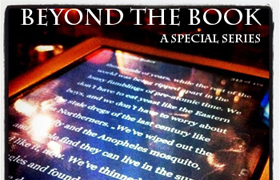
This piece appears in Brian Reich’s upcoming book “Shift & Reset: Strategies for Addressing Serious Issues in a Connected Society.” Read the Kindle version here.
Some people argue that books are outmoded, that there are other media available today that offer more immediate methods for delivering knowledge and insight. But right now, long-form, substantively driven, and thoughtful consideration of the challenges that
our society is facing and how they must be addressed are served best by this format. Nobody wants to read 250 pages off a computer screen, nor does even the best documentary provide the same opportunity to pause for reflection.
So yes, we will want books. But that doesn’t really answer the question of whether evolving commercial conditions will actually support the writing and publication of books.
A confession: I am president of the Authors Guild, the nation’s largest membership organization of professional authors. I am trying to protect the livelihoods of American writers, not just because a lot of my friends are authors, but because a vigorous literary culture is an important component of our democracy, not to mention a worthwhile life.
I am not scared of e-books, although I recognize their limitations. E-books don’t furnish a room; they don’t offer the same reminders, as the presence of a physical book does, of past reading experiences, or the same testimonial to who you are that’s silently offered by a book you put on your shelf. But I do most of my book reading these days on an iPad, although I still like to hold broadsheet newspapers in my hands in the morning, and frequently buy hard copies of books I especially like.
But the increasing popularity of e-books and e-readers has some alarming consequences. The most obvious is that American booksellers, already under heavy pressure from the discounting of bestsellers and online retailing, are being pushed to the point of collapse. Bookstores are not simply places to buy books. They are intellectual hubs in our communities.
My Italian publisher has proposed a model in which bookstores become the place to buy a universal license to own a book in all formats — as a physical object on paper, as an e-book for your reader or computer screen, as an audio book, and whatever else comes down the pipe. But unless momentum gathers quickly for this solution, we will see more and more bookstores going dark.
The second problem is going to be persuading American publishers to maintain a compensation system that maintains reasonable rewards. Right now publishers want to pay a royalty on e-books that is roughly half of what they traditionally paid for books on paper; most are willing to increase that royalty in the second year of a book’s life. What the publishers are trying to create is a model that will allow them to recover their costs quickly and to pay less to the authors of books that don’t have an extended life.
The problem is that the average American author earns about $9,000 a year from writing as it is. Decreasing the rewards will inevitably drive more people out of the profession. And it is hugely unfair, because publishers do quite well with e-books. They have no costs for paper, printing, warehousing or distribution — and no risk, as is the case with physical books, that the volume will be returned for full credit by the bookseller, which is the great bugaboo of publishing.
The biggest threat: book pirates
But far and away the greatest risk of e-books and e-readers is book piracy. Book pirates, who almost inevitably work offshore, can scan and digitize a new book instantly, which they then offer in any available format at a fraction of the publisher’s price. Unchecked, book piracy will destroy the retail book business, much as the illegal swapping of digitized music led to the demise of most retail outlets for popular music. (And please don’t tell me about iTunes — authors write whole books that can’t be sliced up into segregated units like songs.)
The resulting drop in earnings for authors and publishers and booksellers will wither our literary culture. The Constitution empowered Congress to create intellectual property laws out of a belief that creative monopolies are essential to inspire innovation, which invigorates our society. Wiping out the rewards literally means toppling one of the pillars of our democracy.
Of course, it is not all doom and gloom. The traditional barriers to becoming an author have been lowered by digitization. The online publication of books, albeit for free, means that first-time authors who can’t interest a traditional publisher still have a chance to disseminate their work. I take it for granted that some important new voices will first be
heard this way. I like that.
And the promise of digitizing our greatest libraries, so that their contents are available worldwide, will be an enormous boon to freedom of thought everywhere. The legal issues involved are proving difficult in the short run, but I expect those issues to be resolved eventually.
The nonfiction e-book, replete with links to all its sources, to pictures and maps that augment the text, will be a joy. Novels, too, may end up accompanied by some form of instant illustration.
I believe in text and in the uniquely involving experience of reading. And text’s efficiency is unrivaled. A picture may be worth a thousand words, but see how many megs those photos absorb on your hard drive, compared to a written description of the same moment. Text will live.
But we need to think carefully about maintaining the incentives for its creation.
Scott Turow is a writer and attorney. He is the author of nine best-selling works of fiction, including his first novel, Presumed Innocent (1987) and the sequel, Innocent, published by Grand Central Publishing in May, 2010. He has also written two non-fiction books about his experiences in the law. Mr. Turow has been a partner in the Chicago office of SNR Denton, an international law firm, since 1986, concentrating on white collar
criminal defense, while also devoting a substantial part of his time to pro bono matters. He has served on a number of public bodies, including the Illinois Commission on Capital Punishment to recommend reforms to Illinois’ death penalty system, and was the first Chair of Illinois’ Executive Ethics Commission which was created in 2004 to regulate executive branch employees in the Illinois State government. He is also President of the
Authors Guild, the nation’s largest membership organization of professional writers, and is currently a Trustee of Amherst College.



Food for thought, Scott. Any time there’s a paradigm shift, it takes a while to work out the problems. Some industries collapse, others rise. My piece in Mediashift today – “Where’s the Money?” – http://to.pbs.org/1deQnBn – shows authors how to make more money, but I wonder if you agree that most authors write for love? Personally, I just can’t help it. It’s what I do! So I’m not sure that “Decreasing the rewards will inevitably drive more people out of the profession.” I do know it’s driven more people into self-publishing.